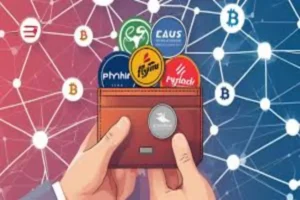Discover the Environmental Benefits of VeChain

VeChain is revolutionizing sustainability through blockchain technology. By providing transparent supply chains, optimizing resource management, and ensuring traceability, VeChain enables businesses to make eco-friendly choices. This technology not only promotes greener practices but also empowers consumers to support sustainable products. Dive in to discover how VeChain is making a significant impact on our planet. Explore the environmental benefits of VeChain with insights from Syntrocoin, linking traders to expert educational resources.
Transparent Supply Chains: Enhancing Environmental Accountability

Transparent supply chains play a huge role in environmental responsibility. Think about it: knowing exactly where products come from and how they get to us can reduce waste and pollution.
VeChain helps by making supply chains visible to everyone. For instance, using VeChain, we can track a product’s journey from raw material to finished item. This means businesses can see if their suppliers follow eco-friendly practices.
Take the fashion industry as an example. Fast fashion is notorious for its environmental impact. But with VeChain, a clothing company can trace the cotton used in a t-shirt back to the farm. If that farm uses sustainable practices, the company can confidently label its t-shirt as eco-friendly.
Consumers can also scan a code on the product to see its entire journey. This transparency encourages companies to adopt greener practices since they know customers are watching.
In food production, VeChain can track the journey of produce from the farm to the grocery store. If a farm uses fewer pesticides and adheres to organic standards, the product can be marketed as such, attracting more eco-conscious buyers. This kind of visibility helps cut down on food fraud and ensures that what’s labeled as “organic” truly is.
Optimized Resource Management: A Green Leap Forward
Using resources wisely is key to sustainability. VeChain helps businesses do just that. By offering detailed data, it allows companies to see exactly where resources are used efficiently or wasted. This information can then be used to make smarter, greener decisions.
Imagine a factory making smartphones. By using VeChain, the factory can monitor the amount of metal and plastic going into each phone. If the data shows excess material being discarded, the factory can adjust its processes to minimize waste. This not only saves money but also conserves resources, making the production process more sustainable.
Another example is in agriculture. Farmers can use VeChain to monitor water usage in their fields. If certain areas are over-irrigated, adjustments can be made to distribute water more efficiently. This not only conserves water but also ensures crops are healthier and less susceptible to disease.
Energy consumption is another area where VeChain shines. Businesses can track energy use in real-time and identify where it’s being wasted. For instance, a company might find that certain machines are left running overnight. By addressing this, they can cut energy use, lower costs, and reduce their carbon footprint.
Reducing Environmental Impact Through Traceability and Verification
Traceability and verification are crucial for reducing environmental impact. With VeChain, businesses can verify that their products meet certain eco-friendly standards. This is done by tracking each step of a product’s lifecycle, from raw materials to final disposal.
Take seafood, for example. Overfishing is a major environmental issue. VeChain can help by tracing the journey of each fish from ocean to table. If a fish is caught in a sustainable manner, this information can be verified and shared with consumers. Shoppers can scan a code on the packaging to see where and how the fish was caught. This encourages sustainable fishing practices since consumers prefer buying verified, eco-friendly products.
Another example is in the electronics industry. Many electronics contain harmful materials that can damage the environment if not disposed of properly. VeChain can track these materials from production to disposal. By doing this, companies can ensure that harmful components are recycled correctly, reducing their environmental impact.
VeChain’s Role in Promoting Circular Economy Practices
The circular economy is all about reusing and recycling materials instead of throwing them away. VeChain plays a big role in promoting these practices. By using blockchain technology, it can track and verify the recycling process of materials, ensuring they are reused properly.
Consider the automotive industry. Cars are made up of many materials that can be recycled, like metal and plastic. VeChain can track these materials from the car’s manufacturing to its eventual disposal. When a car is scrapped, the parts can be tracked to ensure they are recycled and not just thrown into a landfill. This promotes a circular economy by making sure materials are reused instead of wasted.
In the fashion industry, VeChain can help track clothing materials. When clothes are recycled, the fibers can be reused to make new garments. VeChain can verify that the recycling process is done correctly, ensuring that materials are truly being reused.
Conclusion: Making a Difference with VeChain
In conclusion, VeChain offers practical solutions for environmental sustainability. From transparent supply chains to optimized resource management, traceability, and promoting a circular economy, it provides tools that help businesses and consumers make greener choices. By using VeChain, we can all contribute to a healthier planet. So, why not explore how VeChain can help you make more sustainable choices in your daily life?






